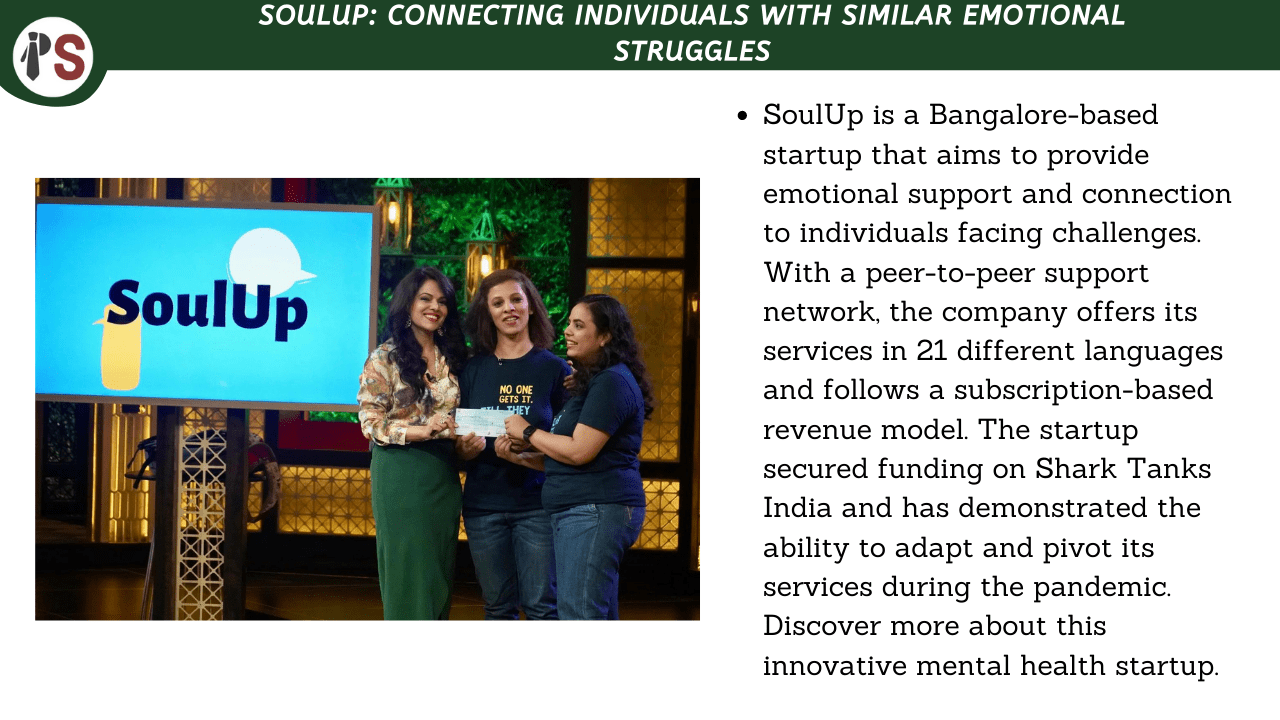
SoulUp is a Bangalore-based startup co-founded by Punita Mittal and Mahak Maheshwari, two highly accomplished individuals with a background in engineering and a deep passion for mental health. Punita has spent over 10 years working in the mental health sector and previously served as the head of Research and AI at Healthify, while Mahak has worked with a consulting company and has experience working with a D2C snacks brand and a women's mental health care company.
The company aims to address the emotional problems that many people face by providing a peer-to-peer connection network where users can connect with others who are facing similar issues.
The founders recognized that emotional damage can lead to feelings of loneliness and fear of being judged, which can prevent people from seeking help. SoulUp aims to remove this barrier by providing a platform for individuals to connect with others who are experiencing similar issues. This creates a safe space where users can share their feelings and receive support from others who can relate to their struggles.
SoulUp is designed to be accessible to people with a range of emotional challenges, including Attention Deficit Hyperactivity Disorder (ADHD), Bipolar Disorder, Depression, and everyday life issues. The platform is available online, and the company offers services in 21 different languages to make it accessible to a global audience.
SoulUp has nine key categories that users can select from to find peers who share their specific challenges. The company has already completed 700 conversations, indicating that there is a demand for this type of service. The charge for a 45-minute video conversation is 99 rupees, making it an affordable option for many people.
SoulUp has also registered 200 peers to date, indicating that there is interest from people who want to help others in this way. The company's mission is to make emotional support accessible to everyone, and they are working towards this goal by building a community of peers who can provide support and understanding to those who need it.
SoulUp follows a subscription-based revenue model, where users can choose from monthly or yearly subscriptions to access its services.
Under this model, customers pay a fee to use SoulUp's services for a set period, and the company generates revenue through recurring payments. The subscription model offers several benefits for both the company and its customers. For the company, it ensures a steady stream of revenue and helps with forecasting and planning. For customers, it offers flexibility, convenience, and access to ongoing support.
SoulUp's revenue system may also include additional revenue streams such as one-time purchases for courses or workshops, partnerships, and sponsorships. However, without further information, it's difficult to determine the extent of these revenue streams and their contribution to the company's overall revenue.
SoulUp's subscription-based revenue model aligns well with the trend towards subscription-based services in the wellness industry. This model has the potential to generate consistent revenue while providing ongoing support to customers.
The startup was seeking funding and requested 50 lakhs rupees for 3% equity in the company. They had two revenue models, one-to-one sessions at 99 rupees and group conversations at 500 rupees per user per session, with 50% going to the facilitator.
Several investors made offers and counter-offers. Anupam and Vineeta made an offer of 50 lakhs for 20% equity in the company. Namita made two offers, 50 lakhs for 20% equity or 25 lakhs for 10% equity and 25 lakhs debt. Aman and Amit jointly offered 50 lakhs rupees for 15% equity, which Namita matched. Anupam and Vineeta also matched the 50 lakh rupee offer for 15% equity.
Punita and Mahak made a counteroffer of 50 lakhs for 5% equity, which was countered by Namita's revised offer of 50 lakhs for 10% equity. Aman and Amit counter-offered 50 lakhs for 9% equity, and Anupam and Vineeta offered 50 lakhs for 10% equity. Namita matched the counter offer made by the pitchers for 50 lakhs in exchange for 5% equity.
Finally, Namita's offer of 50 lakhs for an exchange of 10% equity was accepted, and she became a new investor in SoulUp.
The mental health and wellness industry is a rapidly growing market, with an increasing number of people recognizing the importance of taking care of their mental and emotional health. Additionally, the COVID-19 pandemic has created a surge in demand for online mental health services, as people seek support to cope with the stress and anxiety caused by the pandemic.
Given the increasing demand for mental health and wellness services, SoulUp has the potential to grow and expand its services to cater to a larger audience. The company has already demonstrated its ability to adapt and pivot its services during the pandemic, which bodes well for its future prospects.
However, the mental health and wellness industry is also becoming increasingly competitive, with new startups entering the market and established players expanding their services. SoulUp will need to continue to differentiate itself and offer innovative and high-quality services to stand out in the market.
Overall, while the future of any startup is uncertain, SoulUp appears to be well-positioned to capitalize on the growing demand for mental health and wellness services in India and beyond.
At Professional Saathi, we offer a range of business consultancy services that help businesses improve their performance, achieve growth, and overcome challenges.
Copyright 2026 © Created By KTPG PROFESSIONAL SAATHI CORPORATE CONSULTANT PRIVATE LIMITED, All Rights Reserved.
Leave Your Comment